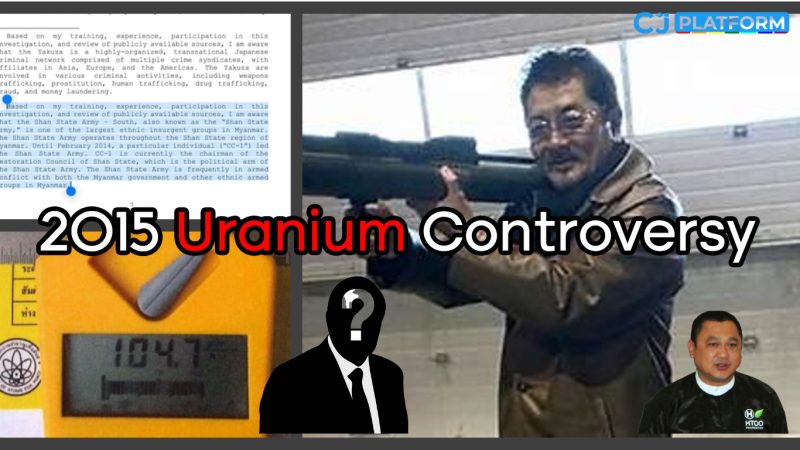“2015 Uranium Controversy”

After the establishment of a civilian government, Myanmar embarked on a path of development but now faces numerous challenges due to a military coup on February 1, 2021.
The country has seen various issues resolved since the transition period, especially under U Thein Sein’s government post-2010 elections, ranging from adopting an open-door policy to renewing international relations. The government’s change to the National League for Democracy (NLD) brought further positive changes.
One significant issue was the potential mining of uranium, a rare element for nuclear energy, in Myanmar. This was against the international restrictions on nuclear energy post-World War II.
What is uranium?
Uranium, a highly radioactive element, is among the few capable of producing nuclear energy. It is considered very rare and valuable internationally.
Discovered by Martin Heinrich in 1789, with its radioactivity identified by Henri Becquerel in 1896, uranium undergoes specific purification steps for use in nuclear bombs, like those used in World War II, and other advanced military applications.
Finding Uranium in Myanmar
The person who took the initiative to let the public know that these rare and precious elements can be found in Myanmar is none other than him.
U Tayza, the owner of the Htoo group of companies, is known by the public as a crony. He brought to public attention the presence of valuable elements like uranium in Myanmar around 2015.
Since the late 1980s, the Technical Service Cooperation (TSC) has been exploring for uranium, particularly around Mogok City and in the Kachin and Taunggyi regions.
During the State Peace and Development Council’s era, a nuclear project conducted by the Ministry of Science and Technology based on uranium was initiated, though no official discovery was announced.
Under U Thein Sein’s administration, Myanmar joined the International Atomic Energy Agency (IAEA).
In early January 2015, U Tayza purchased rocks believed to contain uranium from a mining site near Funkan village, 35 miles from Mogok city in central Myanmar. The price was between 200,000 and 500,000 kyats per pound.
“This is just the beginning. We’ll conduct tests to confirm the uranium’s quality once the season for open testing arrives. I believe this issue should be treated as a matter of national security. Our country faces challenges from others, such as Bangladesh, underscoring the importance of national security,” U Tayza stated during a press conference at his home regarding uranium enrichment.
U Tayza aims to utilize uranium to enable Myanmar to develop nuclear weapons, similar to those of powerful Western nations.
During this time, two major parties, the National League for Democracy (NLD) and the Union Solidarity and Development Party were competing in election campaigns, which meant the public only briefly focused on this uranium issue.
How did this overlooked issue resurface?
Following U Tayza’s announcements, major countries like the United States and China have closely monitored the situation.
The Drug Enforcement Administration (DEA) of the Central Intelligence Agency (CIA), considered among the world’s top intelligence agencies, recovered information through an undercover operation involving a Japanese yakuza gang leader.
Takishi Ebisawa, the yakuza leader, intended to sell uranium obtained from ethnic armed groups in Myanmar to Iran. In 2020, he mistakenly shared information with a DEA agent posing as an Iranian general, including photos and videos as evidence.
Who is the mastermind behind this?
The agent who reported to the US Justice Department after the arrest of the Japanese yakuza leader identified the Burmese ethnic armed leader, known as CC-1, as the chairman of the Shan State Reconstruction Council Shan State Army (RCSS).
However, in the recent indictment filed on February 21, the term “a Burmese ethnic armed leader” was used without specifying names. This was because there was no direct link to the previously mentioned CC-1.
How much uranium can Myanmar produce?
A video recorded conversation between agents and Ibisawa revealed that thousands of kilograms of uranium are available in the territory of an armed leader in Myanmar, which could yield up to 5 tons of nuclear material, according to Ibisawa.
Ebisawa was unaware of the risks involved in such meetings.
How was the Japanese Yakuza leader apprehended?
In April 2022, Ebisawa and a Thai associate were arrested in Thailand while engaged in arms and uranium trading.
Following his arrest, Ebisawa faced charges of conspiracy to traffic drugs and weapons.
Subsequently, he was detained in Brooklyn prison. In February 2024, a US court added a new charge for attempting to sell nuclear materials, and efforts to convict him are ongoing.
What would be the consequences of this transaction?
US Assistant Attorney General Matthew O’Golden explained to international news outlets like CNN that such transactions could have severe consequences, posing a significant threat to the national security and global stability of the United States.
Nuclear weapons are highly destructive, as shown by the atomic bomb dropped on Hiroshima, Japan. Even today, children born in Hiroshima suffer from birth defects, eye damage, and other health issues. Japanese health experts note that the bomb’s effects continue to harm subsequent generations.
How can we control these dangerous nuclear weapons?
Currently, in places like Kachin State and Shan State of Myanmar, China is actively mining for rare earth minerals, which are then exported to China.
These minerals, including dysprosium and terbium, are crucial for manufacturing electric vehicles (EVs) and other technologies. Since the military council took over in 2021, Myanmar’s exports of rare earth minerals to China have surged. The 2023 customs records from the Chinese Department of Revenue show that these exports were valued at over 400 million US dollars in just one year.
This significant value underscores a major issue that has remained unresolved since before the military coup and has become even more pressing as the country’s internal conflict has intensified.
Who can address this issue?

